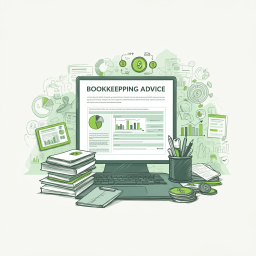Physical Address
304 North Cardinal St.
Dorchester Center, MA 02124
Physical Address
304 North Cardinal St.
Dorchester Center, MA 02124

Thinking about hiring a bookkeeper as an employee in your business? Running a small business means juggling countless responsibilities, from marketing and operations to managing your finances. If bookkeeping feels overwhelming, hiring a bookkeeper can free up your time and reduce stress. But how do you choose the right one for your business? This guide walks you through everything you need to know about hiring a bookkeeper, from understanding what bookkeepers do to finding a qualified professional that fits your needs and budget. Well also go over the pros and cons of hiring a bookkeeper.
A bookkeeper handles the day-to-day financial tasks that keep your business running smoothly. These include:
Before hiring a bookkeeper, the first step is to consider what a bookkeeper does. A bookkeeper handles the day-to-day financial tasks that keep your business running smoothly. These include:
If your business needs more advanced bookkeeping support, you might consider a full charge bookkeeper. Unlike traditional bookkeepers, full charge bookkeepers handle additional responsibilities, such as preparing monthly financial statements and managing payroll taxes.
By ensuring your books are in order, bookkeepers provide you with the financial clarity you need to make informed decisions.
Not sure if it’s time to hire a bookkeeper? Here are some signs:
If any of these resonate, it just might be time to consider hiring a bookkeeper. However, before jumping to that conclusion, it pays to consider some other alternatives.

Assuming that you’ve decided that hiring a bookkeeper is a good idea, selecting the right bookkeeper is crucial. Here’s what to look for:

Here are some ways to find a qualified bookkeeper:
In-House vs. Outsourced Bookkeepers
Should you hire an in-house bookkeeper or outsource the work? Consider these factors carefully before actually hiring a bookkeeper:
| In-House Bookkeeper | Outsourced Bookkeeper |
|---|---|
| Works onsite in your office | Works remotely or for a bookkeeping firm |
| Better for larger businesses with constant financial activity | Ideal for small businesses with fewer transactions |
| May cost more due to salary and benefits | Often more affordable |
| Immediate access for questions or tasks | Flexible services tailored to your needs |
For more on outsourcing, visit Outsourced Bookkeeping.

Before hiring a bookkeeper, ask these questions:
If your small business needs a higher level of financial management, hiring a full charge bookkeeper might be the solution. These professionals take on more comprehensive tasks, including preparing and analyzing financial reports, handling regulatory compliance, and working closely with accountants during tax season. (Link to Tier 4: Full Charge Bookkeeper Job Description).

Choosing Based on Price Alone: Low fees can sometimes mean lower quality.
Bookkeeping rates vary greatly based on location and the bookkeeper’s experience levels. Hourly fees typically range from $20 to $40 per hour. An hourly rate of $20 to $40 translates into a yearly salary range of $41,600 – $83,200. Freelance bookkeepers typically charge much higher hourly rates, typically from $50 to $125.
However, since freelance bookkeepers and accountants are usually more experienced, they can often perform the required work in less time. For that reason, it’s not unusual for small businesses paying freelance/outsourced bookkeepers less than they would have paid a full -time employee for the same work. Some bookkeepers charge a flat monthly fee based on the complexity of your needs. Depending on the amount of work involved, flat fees typically run from $300 for a small, simple service business up to several thousand dollars for larger, more complex client.
While bookkeepers maintain records and prepare financial reports, tax preparation is often handled by accountants. However, some bookkeepers offer tax support.
Not necessarily. Many small businesses benefit from part-time or outsourced bookkeeping services. Most small business start-ups outsource the bookkeeping function while they’re small, as this usually is the most cost-effective alternative.
If you haven’t already read about full charge bookkeepers that’s a good place to start. You can also check out this article by the staffing company Robert Half.
Hiring a bookkeeper can transform the way you manage your business finances, giving you more time to focus on growth. Whether you choose a traditional bookkeeper or a full charge bookkeeper, understanding your needs is the key to finding the right fit. By asking the right questions and avoiding common pitfalls, you’ll ensure a smooth financial future for your business.